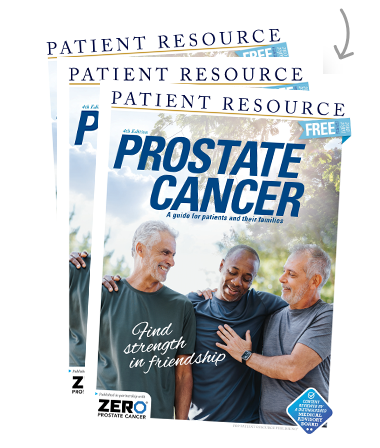Prostate Cancer
Maintaining Care
For some men, when prostate cancer treatment ends and follow-up care begins, your health care provider will provide you with a follow-up care plan that includes a summary of your treatment plan along with a schedule of appointments for physical exams and medical tests. These enable your health care provider to check whether the cancer has returned or spread to other parts of the body and to watch for any other health problems that may develop months or years after treatment ends.
This plan may also include referrals for cancer rehabilitation, such as physical therapy, career counseling, pain management, nutritional planning and emotional counseling. It will include information about your risk of a recurrence or a second cancer and recommended cancer screening guidelines.
Follow-up appointments also give you the opportunity to address new symptoms or concerns. Tell your doctor how you feel physically, mentally and emotionally, or sooner if something changes. Some topics you may want to discuss include:
- Hormone-related symptoms
- Unrelieved pain
- Sexual dysfunction
- Anxiety
- Depression
Making Healthy Lifestyle Choices
Whether or not you are still receiving treatment, leading a healthy lifestyle may help you do the following:
- Build back your strength with nutritious foods
- Reduce your risk of heart disease, high blood pressure, excess weight and diabetes
- Lower anxiety
- Increase positive feelings
- Prevent bone loss (osteoporosis)
Monitor your bone health. This is especially important if you have had hormone therapy because the reduction in testosterone may contribute to bone loss and a lower bone density, which may progress to osteoporosis. If osteoporosis develops, your risk of spontaneous fracture or fracture after a fall is increased. Your health care provider may order a bone density scan to establish a baseline for your bone health. This will help monitor your treatment’s effect on your bones and indicate whether bone-strengthening drugs may help.
Ask your doctor about exercise. Regular exercise after treatment may help you manage anxiety, maintain a healthy weight, boost muscle strength and endurance, increase self-esteem and improve heart health.
Consult with your doctor or a dietitian. Good nutrition gives your body essential nutrients to improve your health. This includes vegetables, fruits, whole grains, lean protein and low-fat dairy products.
Stop tobacco use. If you use tobacco products, there is overwhelming evidence that it is best that you quit to improve treatment outcomes, have fewer side effects, recover faster, lower your risk of second cancers or serious cardiovascular or lung disease, give you more energy and improve your quality of life. Ask your health care team about options to help you.
Avoid or limit alcohol consumption. Research shows any amount of alcohol can increase your risk for cancer. If you continue to drink alcohol, limit the amount you consume to two drinks or less a day.
Watching for Late and Long-term Effects
It is possible for side effects to develop months or years after treatment ends, and these are known as late effects. For others, side effects are more long term, beginning during treatment and continuing after it is finished. To help you manage these effects, communication with your health care team is important. Based on your symptoms, your provider may order certain exams, scans or blood tests to find and manage the effects.
Some common late effects of prostate cancer include the following:
- Anemia
- Anxiety
- Bone problems (osteoporosis)
- Bowel problems (such as diarrhea or constipation)
- Depression
- High blood pressure, high cholesterol and high blood sugar levels
- Hot flashes
- Issues with sexual health, intimacy and body image
- Urinary problems
Ask your doctor about side effects to watch for.
Maintenance Therapy
Sometimes continuous or maintenance therapy is needed. Maintenance therapy is given to help prevent cancer from returning after it has disappeared following the initial therapy. It may include treatment with drugs, vaccines or antibodies, and it may be given for a long time. It may also be given to delay the growth of advanced cancer after initial treatment.
Maintenance therapy may be given for weeks to years depending on the cancer, the drugs used, how well treatment worked and the number and severity of side effects.
Prepare for Scanxiety
The term “scanxiety” is the feeling of stress or worry you may have before a medical test, during the test and while you wait for results. The tests may be performed for diagnosis, to monitor treatment or to determine whether there is a recurrence. Physical sensations of scanxiety may include trouble eating and sleeping, increased heart rate, irritability, sweaty palms and nausea.
First, remind yourself that it is normal to feel this way. Set expectations with your medical team about when and how you will receive the results so you are not left waiting and wondering. Knowing this information is empowering and can help you manage the uncertainty while you await results.



